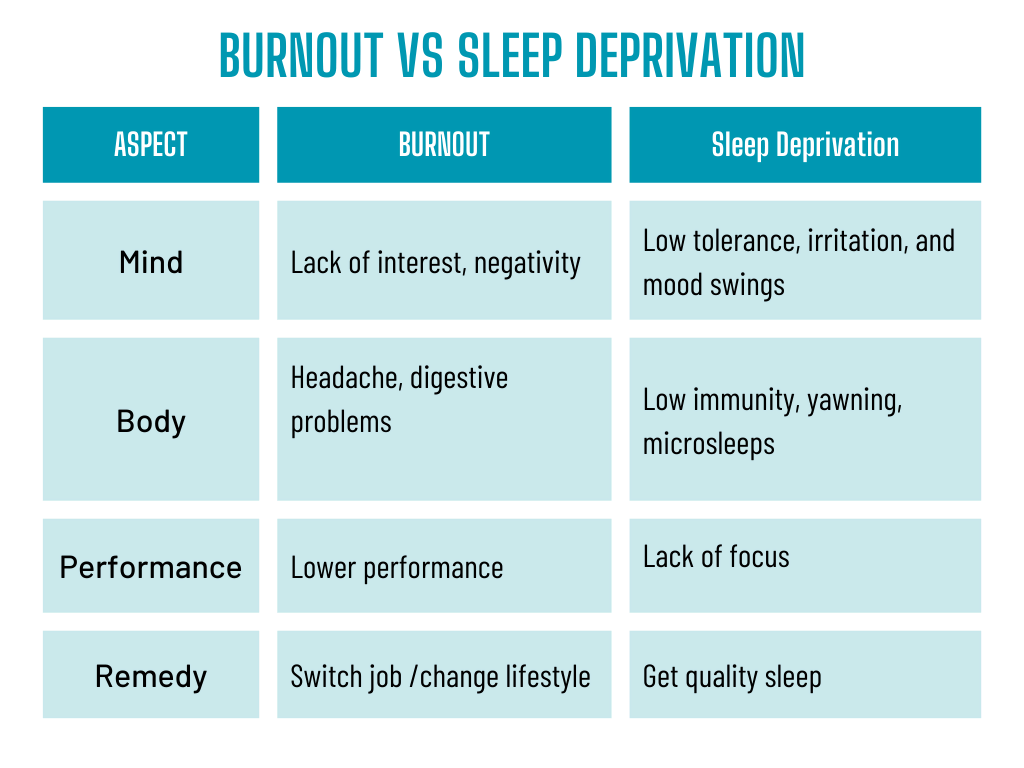Burnout or Just Exhausted? Spotting Sleep Deprivation in Workplace Mental Health
April 9, 2025 2025-04-10 17:38Burnout or Just Exhausted? Spotting Sleep Deprivation in Workplace Mental Health

Burnout or Just Exhausted? Spotting Sleep Deprivation in Workplace Mental Health
Introduction
In today’s high-performance workplace, fatigue is often brushed off as a side effect of ambition. But persistent tiredness might be signaling something deeper: burnout or sleep deprivation.
What is the problem?
According to the study on PubMed, burnout and sleep deprivation have become more common among working professionals. Both have negatively impacted the productivity and health of people.
Understanding the difference is crucial for all human resource managers and leaders, but most HRs don’t understand the difference between burnout and sleep deprivation.
Early detection can help prevent exhaustion and inadequate sleep, thus improving the overall energy and health of the workforce and increasing productivity.
Source: Michigan Medicine | Source: Columbia Psychiatry
What is burnout?

Burnout is a condition when you are physically, mentally, and emotionally drained. Excessive and prolonged stress can leave you exhausted.
The main reasons behind stress are demanding jobs, a lack of discipline, and unbridled ambition and expectations.
What are the common signs of burnout?
The common symptoms of burnout are as follows:
- Long fatigue
- Drop in productivity
- Reluctance and negativity towards work
- Disinterest
If you have the above-mentioned symptoms, then you are definitely in a state of burnout.
What is sleep deprivation?

Sleep deprivation is the lack of quality sleep. When you are not sleeping enough, on time, or not experiencing deep sleep, you suffer from sleep deprivation. The negative consequences of sleep deprivation include lower brain functioning and irritation. and tiredness.
What are the signs of sleep deprivation?
The common symptoms of sleep deprivation are as follows:
- Daytime sleepiness
- Difficulty in concentration
- Low tolerance or irritation
- Weak Immunity
- Lack of energy
What are the common symptoms of burnout and sleep deprivation?
There are few common signs in both burnout and sleep deprivation, as mentioned below:
- Tiredness
- Irritation and lower levels of tolerance
- Lower energy and focus
- Low performance at work
As per PMC, the common symptoms may create confusion during the diagnosis. We may attribute sleep-related problems to stress-related issues and vice versa.

The Role of Sleep Disorders in Workplace Fatigue
Sleep apnea is a medical condition that is most often undiagnosed. It can lead to disrupted sleep and fatigue during the day. According to studies conducted by Bend Headache Centre and PubMed, sleep apnea, if untreated, can mess up your mood, energy levels, efficiency, and focus.
You, your employees, or your colleagues may think that we are just tired, when in reality, they might need professional medical treatment like CPAP therapy using CPAP machines.
What is the root cause? A step-by-step guide for HR professionals
Encourage talking: Create a safe place where employees can discuss their mental health and sleep issues with you.
Use health programs: Conduct sleep assessment tests and educate employees about healthy habits.
Limit workload: Detect early any indicator of burnout and monitor working hours and stress-inducing tasks.
Source: NPR | Wikipedia | Sleep Review
How to implement solutions?
For burnouts, you can take the following measures:
- Conduct stress management programs at the office.
- Offer counselling or EAPs (Employee Assistance Programs)
- Train employees for work-life balance.
For sleep deprivation, you can take the following measures:
- Conduct education programs in the office that focus on sleep hygiene (limiting screen time and ensuring consistent sleep timing).
- Offer tests in the office to diagnose sleep disorders.
- Encourage professionals to take naps and maintain silence zones in the office.
Time to seek medical help?
A day off will not solve the problem of chronic tiredness and exhaustion. The HR managers must scan employees with symptoms of regular drainouts and suggest medical help.
- Consult a sleep expert to diagnose any sleep disorder.
- Offer mental health professionals to help employees with burnouts and emotional stress.
Conclusion
Detecting burnouts and sleep deprivation early is the key to healthcare for your employees. Both may show similar signs, but their remedies are different.
Companies boost both productivity and loyalty among their employees by focussing on their overall health, improving their sleep quality, and preventing burnout.
Being proactive in diagnosing fatigue is not only an act of compassion but also a smart business move.
Images Credit: Pexels.com






